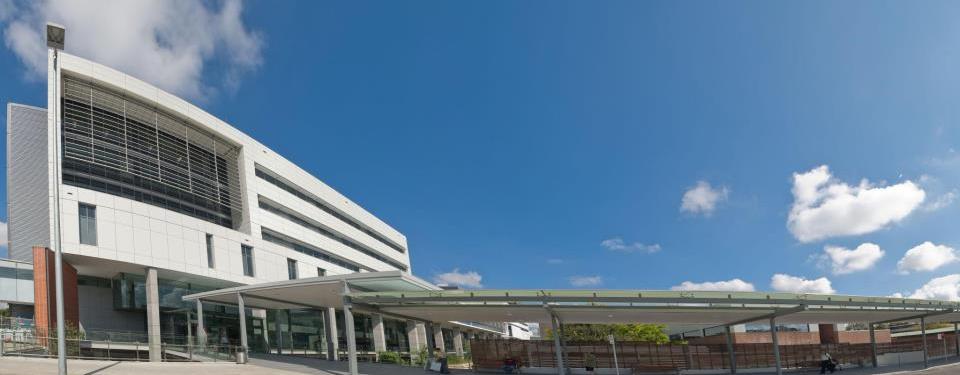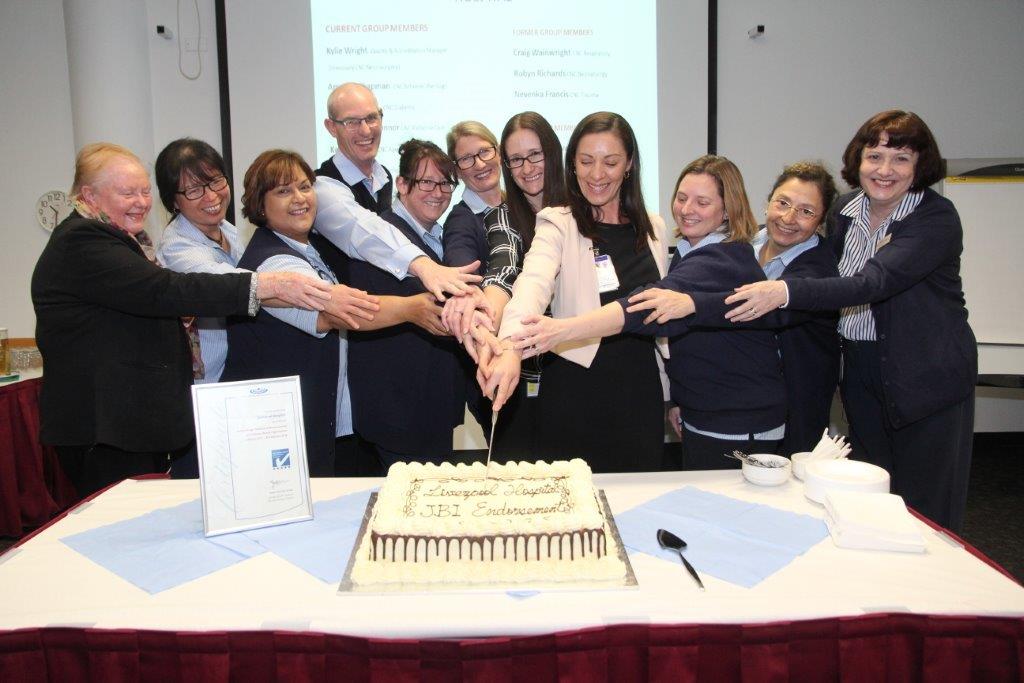Bridging the evidence transfer gap

Liverpool Hospital is an 875 bed public tertiary referral hospital and major trauma centre in Sydney, Australia. The hospital has a strong commitment to teaching and research across a wide range of disciplines and serves between 1.3 and 1.4 million people in the South West of Sydney.
The hospital has well established, integrated processes and a governance framework in place to actively manage patient safety and quality risks, and to set, monitor and improve the performance of the organisation. Clinical Nurse Consultants are advance practice nurses who play a pivotal role in these processes and provide nursing leadership that facilitates the ongoing development of clinical practice and utilisation of research findings in the provision of clinical services.

In 2014, frontline Clinical Nurse Consultant leaders at Liverpool Hospital reported challenges in evidence transfer. They advised that implementing individually-led improvement projects which included implementing the findings of research were challenging. Also, if projects were successful, the outcomes were often limited to the specialty in which the individuals worked.
“The efficiency and productivity of such work was virtually non-existent at Liverpool Hospital as these nursing leaders reported time constraints, lack of knowledge and lack of clinical partnerships as barriers in undertaking evidence transfer”, says Kylie Wright, Director of Patient Safety & Quality.
In response, ten Clinical Nurse Consultants, the hospital’s library manager and a consumer representative formed a group under the leadership of the Director of Nursing & Midwifery and Kylie Wright. Kylie had undertaken JBI’s Evidence Implementation Training Program (formerly Evidence-based Clinical Fellowship Program) as a Clinical Nurse Consultant and had since become the Director of Patient Safety & Quality. This group, which encompassed nursing leadership and clinical governance, became the JBI Evidence Utilisation Group.
The Group’s purpose was to enhance evidence transfer by assuming collaborative, clinical leadership roles in hospital-wide, evidence-based quality projects and to work towards not only bridging the evidence transfer gap, but to demonstrate a commitment to evidence-based healthcare by undertaking the JBI Endorsement Program and gain JBI Endorsed status for the hospital.
In order to assume clinical leadership roles collaboratively across the hospital to lead and sustain the evidence-based quality project initiatives, the Clinical Nurse Consultants undertook professional development and were provided with leadership opportunities.
Kylie explains, “each Group member underwent the JBI Practical Application of Clinical Evidence System (PACES) training, including an overview of the Getting Research into Practice (GRIP) framework, to help identify factors underpinning gaps between practice and best practice”.
JBI Endorsement Program criteria outlined that staff across the facility have access to a networked computer situated close to their work area, be issued with the organisation’s JBI login details, have access to JBI's EBP tools and resources such as PACES, JBI POOL and JBI RAPid, and furthermore that the organisation have in place education programs to raise awareness of evidence-based practice principles and how to access the JBI Connect+ website. “We achieved this by ensuring all networked computers in clinical areas, which included up to 300 mobile computers on wheels, and were able to access the JBI resources via a standard Liverpool Nursing username and password while at the bedside caring for patients”.
To raise awareness of evidence-based principles across the facility and access to the JBI Connect + website a direct portal was established for all staff via the Liverpool Hospital library webpage, as well as via MyAthens and via Ovid SP. A four module evidence-based practice training program was already available to all staff; hence the Liverpool Hospital library broadened an existing year-round Information Skills program to include training on JBI Connect+ and searching the JBI for evidence- based resources.
Further JBI Endorsement criteria outlines at least two full PACES cycles being registered on the PACES site by the organisation per year and at least one PACES report from the organisation be accepted for publication in the JBI Evidence Synthesis journal (formerly JBISRIR). Utilising translational research, blended with continuous practice improvement, change management techniques and practice development methodologies, the Clinical Nurse Consultant Research group successfully undertook two projects in its first year of inception each involving an ethics submission and a full PACES cycle including a baseline audit, implementation of targeted strategies and follow up audits.
The ‘Excellent Practice in Communication Clinical Handover’ project was the first. It aimed to increase staff compliance with nursing clinical handover best practice recommendations across 11 units at Liverpool Hospital. The project resulted in significantly improved outcomes across all best practice criteria and had an immediate and positive impact on clinical practice with demonstrated sustainability.
Similarly, the second project titled ‘Nutrition as Therapy’ aimed to review and monitor staff compliance with nutrition as therapy best practice recommendations across 19 units and showed promising results, changing assessment practices at the bedside.
Both projects have promoted and supported the transfer and implementation of evidence-based practice thereby assisting in the improvement of patient outcomes. The projects’ reports were published in JBI Evidence Synthesis.
Liverpool Hospital’s demonstrated commitment to the maintenance and enhancement of service delivery based on an evidence-based approach resulted the hospital achieving JBI Endorsed status April 2016.
The JBI Endorsement process continues to provide the framework for nursing services at Liverpool Hospital to undertake hospital wide quality initiatives. Using practice development methodology, patient safety data, National Safety and Quality Health Service Standards, and the available JBI resources, topics for hospital-wide quality project initiatives continue to be chosen and implemented to address topical issues.
The JBI Endorsement Program is embedded into clinical contexts where the importance of evidence-based practice skills acquisition for improving patient care is paramount.
The JBI Endorsement Program body of work at Liverpool Hospital utilises a collaborative approach to undertake hospital-wide quality and research projects. “This has empowered Clinical Nurse Consultants by creating a forum for professional development, networking and mentoring”, says Kylie. In addition, nurses, facility wide have been empowered to utilise the best available evidence to inform decision making at the point of care, leading to better patient outcomes. The program benefits enormously from being led by Clinical Nurse Consultant leaders who can target clinical microsystem teams, integrate evidence into new and existing programs of work, and play a fundamental role in transformation.
“Some Clinical Nurse Consultants who have been involved in this work have published quality projects and presented at nursing conferences as a direct result of their participation in the program. Several Clinical Nurse Consultants have implemented the methodology in their own specialty wards to promote learning, patient care and research using evidence-based practice principles”, says Kylie.
In line with the aim to develop and enable Clinical Nurse Consultants to become independent learners and continue to contribute to evidence transfer and scholarly literature in their field, Liverpool Hospital supports nurses, via a scholarship, to undertake the Evidence Implementation Training Program, undertake their own clinical leadership projects, and develop their skills of evidence utilisation and transfer. This has resulted in the completion of projects such as continence management and hourly rounding across multiple units at Liverpool Hospital.
The success of Liverpool Hospital’s approach to evidence-based practice and utilisation of the JBI Endorsement Program has extended beyond Liverpool Hospital and into the remaining five hospitals within the South Western Sydney Local Health District. In 2017, the Evidence Implementation Training Program was delivered using a tailored approach to 12 senior nurses across the South Western Sydney Local Health District and involved an approach of linking Clinical Nurse Consultants across hospitals to undertake the same project across multiple sites. Six topics, aligned to key safety and quality issues were chosen, and were highlighted via incident data. This process is currently being repeated in 2018/19 with a further 28 senior nurses undertaking the Evidence Implementation Training Program covering a further six topics including challenging behaviours, correct patient identification, and care of intravenous catheter sites to name a few.
The Liverpool Evidence Utilisation Group continues to support all Evidence Implementation Training Program projects and provides governance to ensure positive results are implemented hospital wide. Indeed, the Evidence Utilisation Group and the approach of undertaking hospital-wide quality initiatives has become well established across Liverpool Hospital as a method to promote evidence-based nursing practice. The Group has a formalised governance structure and established meetings, roll-out and sustainability plans and timelines to ensure the results of projects, and future projects, continue to be maintained and the three-year JBI Endorsed status is maintained.
“An informal evaluation of the program indicates it is achieving its aims and supporting Liverpool Hospital’s vision of being Australia’s safest hospital”, Kylie says.
Kylie adds, “An exciting feature of the program is that it can be transferable to other practice settings and integrated into other disciplines, such as allied health, highlighting its pivotal role across the entire healthcare spectrum”. Discussions are in progress towards planning a program that will embed evidence-based practice into a multidisciplinary, patient-centred environment and to also incorporate non-clinical services, such as education, management, and corporate services
Further reading